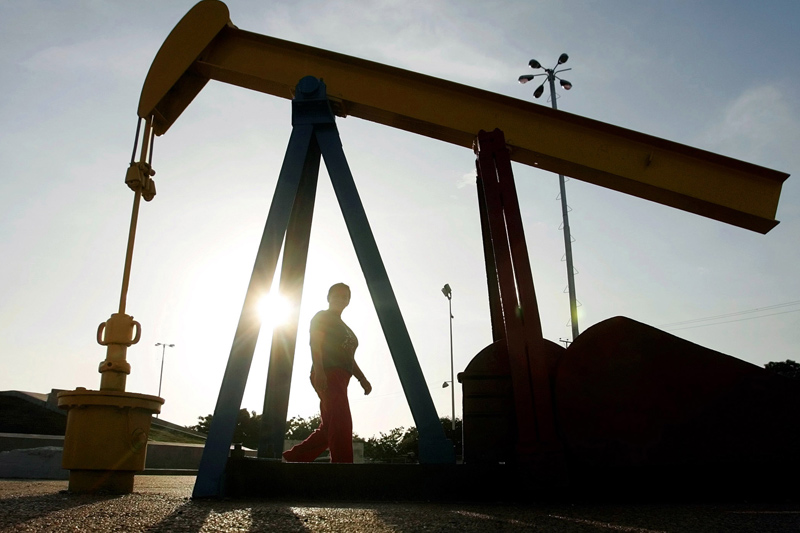Investing.com - Crude oil futures extended Friday's gains into Tuesday on hopes Greece will decide to stay in the eurozone.
Concerns Iranian nuclear talks may hit fresh hurdles sent oil up slightly as well.
On the New York Mercantile Exchange, light, sweet crude futures for delivery in July traded at USD90.94 a barrel in Asian trading Tuesday, up 0.09%, off from a session high of USD91.39 and up from an earlier session low of USD90.86.
Delegates from the U.S., U.K., China, France, and Russia and Germany recently wrapped up talks with Iranian officials to diffuse a standoff involving Iran's nuclear plans, which ended largely with no progress.
The West has accused Iran of enriching uranium to build nuclear weapons, a charge Tehran denies, arguing its nuclear program serves the country's energy needs.
Oil prices fell in recent months when Iran agreed to come to the negotiating table, however, talks ended last week with no results save an agreement to continue discussions in June.
Earlier this year, Iran protested economic sanctions from the West by threatening to close the Strait of Hormuz, a narrow waterway connecting oil-rich Persian Gulf countries with the rest of the world.
Fears that Israel may strike Iranian military targets unilaterally pushed oil prices up earlier this year as well.
Tensions remain relatively calm, although the recent impasse sparked some buying on sentiment saber rattling could return and send prices back up down the road.
Meanwhile in Greece, recent polls show the mainstream New Democracy political party is rising in popularity ahead of June 17 polls, and a strong showing could lead to a coalition government in favor of sticking with the euro, which would be bullish for the euro.
Financial fears in Spain offset oil's gains.
Spain’s government is set to arrange a EUR19 billion recapitalization of one of the country’s largest commercial lenders, Bankia, which further weighed down on the euro, as worries persisted that the Spanish government may need to used sovereign debt to shore up the financial institution
On the ICE Futures Exchange, Brent oil futures for July delivery were down 0.32% and trading at USD106.94 a barrel, up USD16.00+ from its U.S. counterpart.
Concerns Iranian nuclear talks may hit fresh hurdles sent oil up slightly as well.
On the New York Mercantile Exchange, light, sweet crude futures for delivery in July traded at USD90.94 a barrel in Asian trading Tuesday, up 0.09%, off from a session high of USD91.39 and up from an earlier session low of USD90.86.
Delegates from the U.S., U.K., China, France, and Russia and Germany recently wrapped up talks with Iranian officials to diffuse a standoff involving Iran's nuclear plans, which ended largely with no progress.
The West has accused Iran of enriching uranium to build nuclear weapons, a charge Tehran denies, arguing its nuclear program serves the country's energy needs.
Oil prices fell in recent months when Iran agreed to come to the negotiating table, however, talks ended last week with no results save an agreement to continue discussions in June.
Earlier this year, Iran protested economic sanctions from the West by threatening to close the Strait of Hormuz, a narrow waterway connecting oil-rich Persian Gulf countries with the rest of the world.
Fears that Israel may strike Iranian military targets unilaterally pushed oil prices up earlier this year as well.
Tensions remain relatively calm, although the recent impasse sparked some buying on sentiment saber rattling could return and send prices back up down the road.
Meanwhile in Greece, recent polls show the mainstream New Democracy political party is rising in popularity ahead of June 17 polls, and a strong showing could lead to a coalition government in favor of sticking with the euro, which would be bullish for the euro.
Financial fears in Spain offset oil's gains.
Spain’s government is set to arrange a EUR19 billion recapitalization of one of the country’s largest commercial lenders, Bankia, which further weighed down on the euro, as worries persisted that the Spanish government may need to used sovereign debt to shore up the financial institution
On the ICE Futures Exchange, Brent oil futures for July delivery were down 0.32% and trading at USD106.94 a barrel, up USD16.00+ from its U.S. counterpart.
